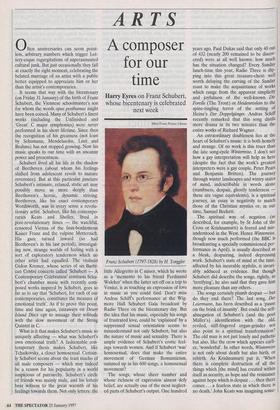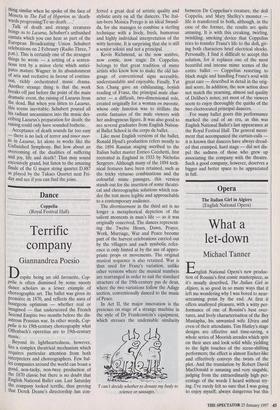ARTS
A composer for our time
Harry Eyres on Franz Schubert, whose bicentenary is celebrated next week
Mary Evans Picture Library
Franz Schubert (1797-1828) by H Totggler °ften anniversaries can seem point- less, arbitrary numbers which trigger Lot- tery-esque regurgitations of superannuated cultural junk. But just occasionally they fall at exactly the right moment, celebrating the belated marriage of an artist with a public better equipped to appreciate him or her than the artist's contemporaries.
It seems that way with the bicentenary (on Friday 31 January) of the birth of Franz Schubert, the Viennese schoolmaster's son for whom the words opus posthumus might have been coined. Many of Schubert's finest works (including the Unfinished and `Great' C major symphonies) were never performed in his short lifetime. Since then the recognition of his greatness (not least by Schumann, Mendelssohn, Liszt and Brahms) has not stopped growing. Now his music speaks to our time with an uncanny power and presentness.
Schubert lived all his life in the shadow of Beethoven (about whom his feelings shifted from adolescent revolt to mature reverence). But at this particular juncture Schubert's intimate, relaxed, static art may possibly move us more deeply than Beethoven's heroic, dynamic striving. Beethoven, like his exact contemporary Wordsworth, was in every sense a revolu- tionary artist. Schubert, like his contempo- raries Keats and Shelley, lived in post-revolutionary times — the watchful, censored Vienna of the faux-bonhomous Kaiser Franz and the vulpine Metternich. His gaze turned inward (so had Beethoven's in his last period), investigat- ing new, strange worlds of feeling with a sort of exploratory tenderness which no other artist had equalled. The violinist Gidon Kremer, whose series of six Barbi- can Centre concerts called 'Schubert — A Contemporary Celebration' contrasts Schu- bert's chamber music with recently com- posed works inspired by Schubert, goes so far as to say that 'Schubert, for each of our contemporaries, constitutes the measure of emotional truth'. As if to prove this point, time and time again, castaways on Desert Island Discs opt to assuage their solitude with the slow movement of the String Quintet in C.
What is it that makes Schubert's music so uniquely affecting — what was Schubert's own emotional truth? A fashionable con- temporary thesis makes Schubert, like Tchaikovsky, a closet homosexual. Certain- ly Schubert seems about the least macho of all male composers — which may indeed be a reason for his popularity in a world suspicious of patriarchy. Schubert's circle of friends was mainly male, and his letters bear witness to the great warmth of his feelings towards them. Not only letters: the little Allegretto in C minor, which he wrote as a 'memento to his friend Ferdinand Walther' when the latter set off on a trip to Venice, is as touching an expression of love in music as you could find. Don't miss Andras Schiff's performance at the Wig- more Hall Schubert Gala broadcast by Radio Three on the bicentenary day. But the idea that his music, especially his songs of frustrated love, could be 'explained' by a suppressed sexual orientation seems to misunderstand not only Schubert, but also the nature of music and sexuality. There is ample evidence of Schubert's erotic feel- ings towards women. And if Schubert 'was' homosexual, does that make the entire movement of German Romanticism, summed up in his 600 songs, a homosexual movement?
The songs, whose sheer number and whose richness of expression almost defy belief, are actually one of the most neglect- ed parts of Schubert's output. One hundred years ago, Paul Dukas said that only 40 out of 432 (nearly 200 remained to be discov- ered) were at all well known: how much has the situation changed? Every Sunday lunch-time this year, Radio Three is dip- ping into this great treasure-chest: well worth delaying the carving of the Sunday roast to make the acquaintance of works which range from the apparent simplicity and joyfulness of the well-known Die Forelle (The Trout) or Heidenrostein to the spine-tingling terror of the setting of Heine's Der Doppelganger. Andras Schiff recently remarked that this song distils more drama in its two minutes than the entire works of Richard Wagner.
An extraordinary doubleness lies at the heart of Schubert's music: it is both homely and strange. Of no work is this truer than the late song-cycle Winterreise. I don't see how a gay interpretation will help us here (despite the fact that the work's greatest interpreters were a gay couple, Peter Pears and Benjamin Britten). The journey through winter landscapes and wintry states of mind, indescribable in words alone (numbness, despair, ghostly tenderness these are vague equivalents), is a spiritual journey, an essay in negativity to match those of the Christian mystics or, in our time, Samuel Beckett.
The spiritual way of negation (as described, for example, by St John of the Cross or Krishnamurti) is feared and mis- understood in the West. Hence Winterreise, though now much performed (the BBC is broadcasting a specially commissioned per- formance in April), is usually described as a bleak, despairing, indeed depressing work. Schubert's state of mind at the time, affected by his incurable syphilis, is invari- ably adduced as evidence. But though Schubert did describe the songs, rightly, as `terrifying', he also said that they gave him more pleasure than any others.
The songs certainly plumb despair — but do they end there? The last song, Der Leiermann, has been described as a 'pause on the brink of insanity'. But could the self- abnegation of Schubert's (and the poet Muller's) identification with the old, reviled, stiff-fingered organ-grinder not also point to a spiritual transformation? The old man is not just lonely and pathetic but also, like the crow which appears earli- er, 'wonderful'. In other words, Winterreise is not only about death but also birth, or rebirth. As Krishnamurti put it, 'When there is complete destruction of all the things which [the mind] has created within itself as security, as hope and the resistance against hope which is despair . . then there comes ... a fearless state in which there is no death.' John Keats was imagining some- thing similar when he spoke of the face of Moneta in The Fall of Hyperion as 'death- wards progressing/To no death Talk of death and strange creatures brings us to Lazarus, Schubert's unfinished cantata which you can hear as part of the European Broadcasting Union Schubert celebrations on 2 February (Radio Three, 7 P.m.). This is certainly one of the strangest things he wrote — a setting of a senten- tious text by a minor cleric which antici- pates mature Wagner in its abandonment of aria and recitative in favour of continu- ous, richly orchestrated music drama. Another strange thing is that the work breaks off just before the point of the main dramatic event, the raising of Lazarus from the dead. But when you liSten to Lazarus, this seems inevitable: Schubert poured all his radiant uncanniness into the music des- cribing Lazarus's preparation for death: the raising could only have sounded bathetic. Acceptance of death sounds far too easy — there is no lack of terror and timor mor- tis in Lazarus, let alone in works like the Unfinished Symphony. But how about an overcoming of the dualities of suffering and joy, life and death? That may sound excessively grand, but listen to the amazing finale of the G major string quartet D.887 as played by the Takacs Quartet next Fri- day and see if you can find the joins.



































































 Previous page
Previous page